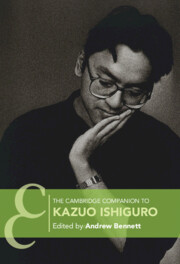Book contents
- The Cambridge Companion to Kazuo Ishiguro
- The Cambridge Companion to Kazuo Ishiguro
- Copyright page
- Contents
- Figures
- Contributors
- Acknowledgements
- Chronology
- Abbreviations
- Introduction
- Part I Kazuo Ishiguro in the World
- 1 Ishiguro and the Question of England
- 2 Ishiguro and Japan
- 3 Ishiguro and Colonialism
- 4 Immigration and Emigration in Ishiguro
- 5 Ishiguro and Translation
- Part II Literature, Music, and Film
- Part III Ethics, Affect, Agency, and Memory
- Guide to Further Reading
- Index
- Cambridge Companions To …
2 - Ishiguro and Japan
History in An Artist of the Floating World
from Part I - Kazuo Ishiguro in the World
Published online by Cambridge University Press: 16 March 2023
- The Cambridge Companion to Kazuo Ishiguro
- The Cambridge Companion to Kazuo Ishiguro
- Copyright page
- Contents
- Figures
- Contributors
- Acknowledgements
- Chronology
- Abbreviations
- Introduction
- Part I Kazuo Ishiguro in the World
- 1 Ishiguro and the Question of England
- 2 Ishiguro and Japan
- 3 Ishiguro and Colonialism
- 4 Immigration and Emigration in Ishiguro
- 5 Ishiguro and Translation
- Part II Literature, Music, and Film
- Part III Ethics, Affect, Agency, and Memory
- Guide to Further Reading
- Index
- Cambridge Companions To …
Summary
This chapter considers the question of Ishiguro and Japan by discussing the author’s engagement with Japanese history in An Artist of the Floating World. Ishiguro says that he is not interested in documenting detailed history in his novels: rather, history is little more than a general background against which characters’ psychological dramas are staged. Set in Japan immediately after the end of the Pacific War, Ishiguro’s second novel is intended to be no exception. However, in view of the way that the novel thematizes such a sensitive issue as artists’ war responsibility, it is important to know about the historical reality and to understand how Ishiguro adapts and fictionalizes it. The chapter focuses on the way artists’ war responsibility was debated in post-war Japan and places Masuji Ono, the narrator Ishiguro created, in that historical context. In the process, Ishiguro’s particular concerns are thrown into relief. This kind of historical reading is necessary not least because problems of the period depicted by the novel haunt the Japanese even now.
- Type
- Chapter
- Information
- The Cambridge Companion to Kazuo Ishiguro , pp. 27 - 40Publisher: Cambridge University PressPrint publication year: 2023
- 2
- Cited by

